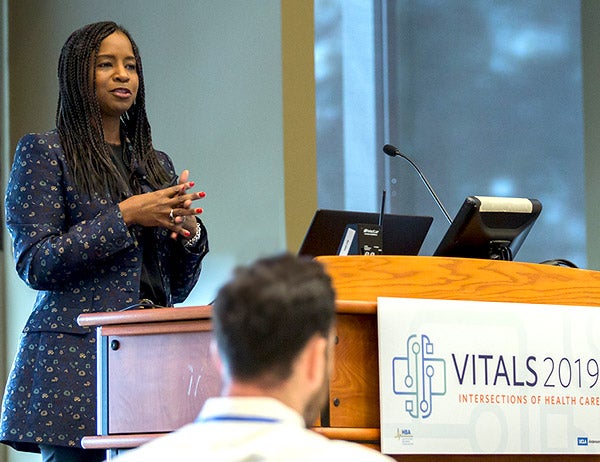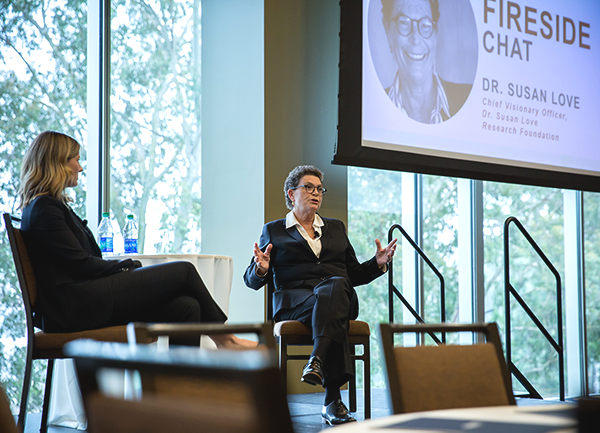MBAs Can Make the Vital Difference in the Business of Health Care
MBAs Can Make the Vital Difference in the Business of Health Care

VITALS, the annual interdisciplinary UCLA Anderson Healthcare Business Association conference, convened in 2019 under the theme Intersections of Health Care, with a special focus on how, where and why the industry is making social impact.

Cynthia Patton, Amgen
Keynote speaker Cynthia Patton, senior vice president and chief compliance officer at Amgen (with DaVita, one of the conference’s primary sponsors), came to the pharmaceuticals business as a lawyer. Named by Black Enterprise among the Most Powerful Executives in Corporate America, Patton opened her presentation, titled Health Care Ethics, Equity & Impact, with a salute to Black History Month. She referenced Martin Luther King Jr., quoting, “One of life’s most urgent and persistent questions is, what are we doing for others?”
Inspired by her nurse’s aid mother, whom she watched make a direct difference in the lives of children with special needs, Patton initially worked in law firms with health care clients but felt removed from the hands-on care that she believed really helped people. It wasn’t until her first in-house job with a company that owned HMOs, hospitals and physician practices that she felt like she was making tangible contributions to the consumers needing care. Now she works in a compliance capacity in which her first concern is ethics.
“Everything we do in health care has an ethical component,” she said. “We can make it sound like a business decision or a risk analysis decision. But is it ethical to say to someone, ‘We’re not going to pay for your medicines to prevent you from getting sick, but once you get sick we’ll pay for everything’? We need to show the societal benefit of paying for preventive care.”
Patton is the board chair of the Amgen Foundation, whose programs support science education. She addressed the lack of diversity in clinical trials and inequitable access to care among various populations. She said she asks every day, “What are we doing as an industry not only to create great medicines but also to make sure people have access to them? People have to trust us. The diseases we treat are serious illnesses. When people take our medicines they are often at their most vulnerable.”
It was an appropriately chilly day for a “fireside” chat with the always-warm Dr. Susan Love (’98), a researcher and M.D. committed to preventing and curing breast cancer. Executive vice president of the Healthcare Business Association Gabrielle Larus (’19), a specialist in biotech finance, alliance management and corporate communications, asked Love in a closing keynote conversation where she thinks her field is advancing. Love expressed enthusiasm for new AI technologies that make inevitable improvements in access and diagnosis.
For instance, in Guadalajara, women wait nine months for breast ultrasound (which, unlike mammogram, distinguishes among different kinds of lumps) because their region doesn’t have enough radiologists. The Dr. Susan Love Research Foundation is working in Mexico now to develop an app to enable access to earlier prediagnosis. Given what AI and other technologies can put right in our hands, especially in developing countries, said Love, “We should be leap-frogging the current system, not making plodding incremental changes.”

Gabrielle Larus and Susan Love
But more than anything, she said, “We really have to study women!” In a world where more medical research is conducted on rats than on women, Love’s foundation conducts research only on female human subjects. She said, “The whole microbiome project completely skipped the breast,” where, she noted, a vast amount of microbial activity is located. So the foundation’s projects include “solving the riddle of the nipple.”
Advanced research and technologies notwithstanding, the Dr. Susan Love Research Foundation initiates some of its programs by decidedly grassroots means, like community word-of-mouth and simple email lists. The Army of Women network accelerates and increases diversity in breast cancer research by connecting women as well as men of all ages, ethnicities and geographies with researchers committed to solving breast cancer questions.
Love and Larus, both cancer survivors, learned as patients what the “collateral damage” of treatment feels like. Post-recovery patient reports are authored by doctors, noted Love, not patients. Larus agreed that her perspective as a marketing professional in the industry was changed by her experience as a consumer. “What the doctor thinks will matter to the patient isn’t what necessarily does matter,” Love said. “We have to talk more to the people actually receiving the care, ask what would make the difference for them. We need to make things more convenient for the patient.”
Interim Dean Al Osborne, who established the successful Johnson & Johnson partnerships with UCLA Anderson’s Price Center for Entrepreneurship & Innovation, closed the conference. “I’m proud of the way the Healthcare Business Association has recognized the deeper connections we need to make between business and health care,” he said. “At UCLA we have an amazing set of allied health centers, an amazing aggregation of health care professionals and institutions. Throwing the management school into that mix, we have the ability to change the world of health care. We are breaking down the silos that keep us from doing great things.” And he exhorted MBAs in the audience to “create new partners in an interdisciplinary world. We can’t do it alone anymore.”